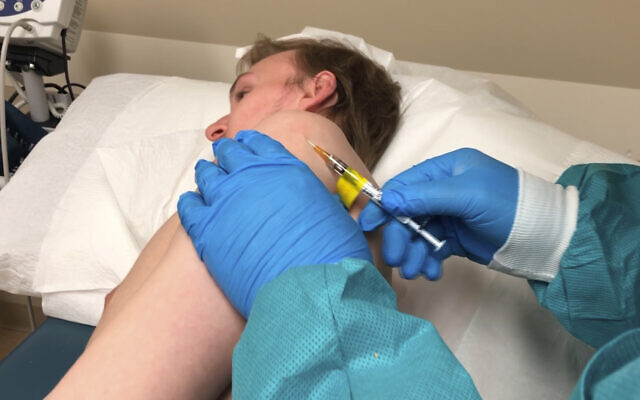Mutation-proof: Israeli scientist nears vaccine that’ll cope with COVID changes
Bar Ilan researcher says she has laid the groundwork after researching coronavirus and identifying protein segments that could be replicated to build immunity

An Israeli scientist says she has laid the groundwork for a vaccine against COVID-19 that is likely to work even if the virus mutates significantly.
“I think that if coronavirus mutates, this vaccine would still be effective,” Milana Frenkel-Morgenstern told The Times of Israel.
Frenkel-Morgenstern, head of Bar Ilan University’s Lab for the BioComputing of Complex Diseases, has filed a provisional US patent application for her research identifying 25 epitopes that she concluded can build immunity against COVID-19.
She said that the epitopes — tiny protein segments that are part of short chains of amino acids known as peptides — can be used to provide immunity. An injection, oral or nasal dose, containing preformed synthetically made epitopes will prompt the body to create antibodies and stimulate virus-fighting t-cells, she added.

Frenkel-Morgenstern believes that if a pharmaceutical company adopts her findings, which were just published in the journal Vaccines, it could use them to create a vaccine and start testing it within six months to a year. She said that such a vaccine would reduce the severity of the illness and provide immunity, but may not provide the full protection that other vaccine teams expect to achieve.

However, she said her research could have the advantage of providing a ready vaccine that is likely to work if the virus undergoes a significant mutation. There have already been lots of tiny mutations to SARS-CoV-2, which causes COVID-19, but while these aren’t expected to affect planned vaccines, there are questions over whether a more notable mutation may impact the effectiveness of a vaccine.
Frenkel-Morgenstern identified the 25 epitopes that she says are suitable for the vaccine using data, and not lab samples of viruses. Each of these epitopes was also validated for use in vaccines for Severe Acute Respiratory Syndrome (SARS) during the outbreak that occurred 18 years ago. The SARS teams ultimately gave up when the outbreak ended.
Frenkel-Morgenstern said that research focusing on the common ground between two different coronaviruses, SARS-CoV-1, which caused SARS, and SARS-CoV-2, strongly suggests that the epitopes will stay the same in SARS-CoV-2 mutations. If several of the epitopes she identified are included in a vaccine, it is likely to be mutation-proof, she said.

“I was really surprised to find a match, with so many epitopes being 100% identical between SARS-CoV-1 and SARS-CoV-2,” she said. “This was a good finding, given it may advance the process of vaccine development.”
Frenkel-Morgenstern suggested that aside from its potential relevance in the case of mutations, her research could produce a vaccine that is suitable for people who are allergic to other coronavirus shots, as several of the epitopes have been tested to verify their non-allergenic and non-toxic natures.
She said that a vaccine based on her research could also prove to be an important fallback option if vaccines that are currently being developed — which tend to work very differently from her concept, often targeting the distinctive spike protein of SARS-CoV-2 — take longer than anticipated to reach the market.
“There are many clinical trials underway for COVID-19 vaccines, but if they run in to safety issues, a peptide vaccine is a good solution,” Frenkel-Morgenstern added.


